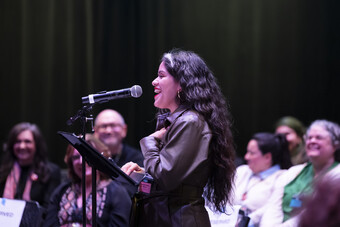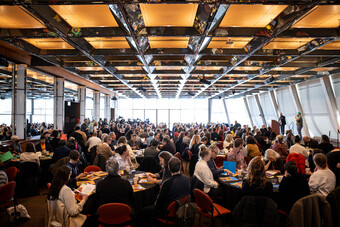The Park(or Creating our Future Commons)
The next activity is more immersive and interactive. Reminded of what Karen Zacarías once said in referring to the LTC movement as a "park" where we can all come together and bring ourselves to a common space, the ask is to conjure an LTC park. I am tasked with manifesting the image that tries to capture what all the groups are working on. It is quite a sight. I step into the space and Rose Cano is on the floor; her figure is delineated as the group reminds me to bring awareness that this needs to be a sustainable park, because, like a human body, it requires nourishment and sustainable care. Another group is using foil and other arts and crafts materials to build some sort of park feature. The group mentions a need for the park to have a story circle or ceremony circle, a type of "meet your mentor" nook. A third group shapes a distinct mound in the middle of their park for perspective and show me where the food trucks will be. When the groups share out about the future of the LTC by creating a park to represent it, there is a call for housing and food, and it hits me hard: there are so many humans that are suffering in this country because of food and house insecurity, and so many more through a massive attack abroad on innocent lives that betrays the very essence of community and humanity; and there, like here, we turn a blind eye. And yet here we are, from different regions of the continent, artists, scholars, allies, thinkers, doers, newbies, and veteranos, once again daring to imagine. Daring to hope. It is a brave thing, to hope. Despair is easy. All we must do is look around. But the work that accompanies the hopeful is difficult, and where the power of true change resides.
At the end of our morning sessions, I am left both hopeful and in a normal amount of despair that I think is common for most of us these days. It's not a paralyzing despair, but simply one that can cause severe inaction. Humans have been harmed by both our actions and inactions, and as the Latinx Theatre Commons, that is also true. Humans’ harm is as inevitable as our carbon footprint, and perhaps the virtue is the ability to continue the quest of no intentional harmdoing and making amends. What matters is that now, more than ever, the organic growth of this movement is leading us to another point of breaking ground. And there are many dormant seeds inside of us that we need to break open. Only then, as a family of promising one-day-will-be trees, can we care for one another and hope that, united as a movement, we can care for so many more outside of our own circles.
Here we are, from different regions of the continent, artists, scholars, allies, thinkers, doers, newbies, and veteranos, once again daring to imagine. Daring to hope.
As our parks, our stages, our movements will continue to grow arid by the greed of our inaction towards climate change, towards hate, towards war, towards harm, may we remember that what makes the LTC's park strong are the giants that helped form it. For this generation to sprout, the vibrations caused by the Latina/o/e/x theatrical giants who, like elephants, created the conditions of success for the rest of us, must truly shake us open. They did the work, now it is our time. Our parks may be drying up, so let us always remember to look to nature for inspiration on how to behave as responsible and sustainable makers. We must listen. We must be humble and work for each other, not just for individualistic ambitions; and we, as artists, must always live to sow.
I had the honor of sharing stories about my ancestor at the end of the night, but I didn't share much about his son—my great-great-grandfather Romulo Escobar Zerman, the father of Mexican agriculture. Among his own gigantean tales of uplifting Mexico and Mexican voices, there are stories about his favorite poem. He, unlike me, apparently found comfort and not anxiety from the words of poets. Famously, “Sembrando” (“Sowing”), by the Spanish writer Manuel R. Blanco Belmonte, translated by my aunt Belinda Alvarez Escobar:
We must fight for all those who do not!
We must ask for all those who do not!
We must make those who do not listen hear!
We must weep for those who cannot weep!
We must live to sow! Always to sow!













Comments
The article is just the start of the conversation—we want to know what you think about this subject, too! HowlRound is a space for knowledge-sharing, and we welcome spirited, thoughtful, and on-topic dialogue. Find our full comments policy here